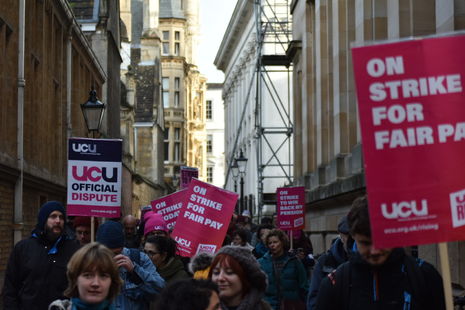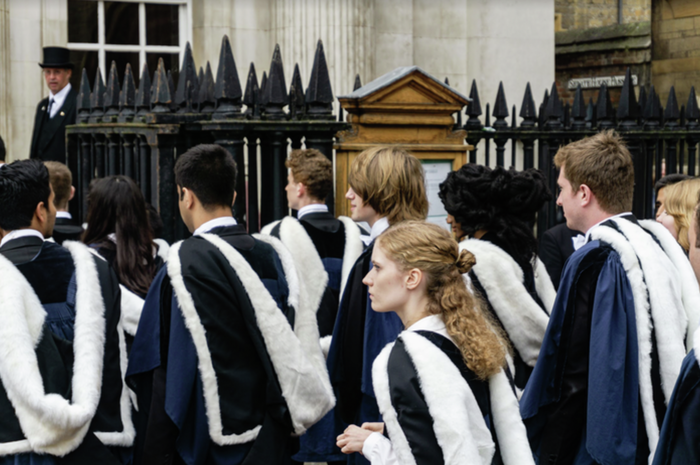Finalists urge UCU to ease impacts of marking boycott
The letter urges the union’s Cambridge branch to pause boycotting of finalists’ work, and to negotiate directly with the university

Finalist students have penned a letter urging Cambridge UCU to lessen the impacts of the ongoing Marking and Assessment Boycott (MAB).
The letter expresses students’ “deep concerns” regarding “the impact of this boycott on [their] futures,” and has gained more than 140 signatures at the time of writing. The letter calls for Cambridge UCU to allow for a pause in the boycotting of finalists’ work following the end of the mandate, on the 30th of September.
The UCU is currently undergoing a consultation on whether to end the boycott early. This consultation ended today (01/09), and results are expected shortly.
The letter goes on to urge the union body to “seriously consider entering in local negotiations with Cambridge directly rather than the national UCEA,” the body negotiating on behalf of UK universities. Cambridge UCU told Varsity, however, that “this is a national dispute based on an aggregated ballot, and branches cannot negotiate directly with individual employers to settle the dispute or to change the nature of the action in any way.”
The letter was written by a group of finalist students in the social sciences, who told Varsity of their “hope of giving finalist students affected by the MAB a voice in negotiations.” The impacts of the MAB, they said, are “disproportionately disruptive, and contravene the strikes wider aims of fairness, justice and equality”.
The MAB means that many final-year students have been prevented from graduating, having not yet received final grades. The letter cites testimonies from students who have been unable to take their places on Master’s courses outside of the UK, struggled to obtain postgraduate funding, and had job offers rescinded due to not having been awarded grades.
The letter also draws attention to the increased impact of the MAB on “those already most vulnerable, including international students, estranged students and those reliant on scholarships for funding”.
The letter notes that support for the union action has “generally been very high amongst the student bodies most impacted: the Arts, Humanities and Social Sciences”. They continued, “we are staunch supporters of the UCU’s demands and the wider strike, and supported the MAB when it was originally declared”. The writers told Varsity that “the students writing this letter have been present on picket lines and UCU rallies for years”.
The statement was not intended as an open letter, its authors said, but aimed “to start an honest and mutually supportive dialogue between students and the UCU”. “We support the UCU continuing their industrial action in their fight for dignified work and pay, including teaching strikes, supervision strikes and marking and assessment strikes for current students,” they continued.
However, a different source close to the letter said: “This letter shows the UCU that “solidarity” is not infinite or unconditional.” They continued: “I hope the UCU leadership shares this letter with its members as soon as possible, and doesn’t try to conceal from them how much students are suffering”.
One student, Sam Hudson, told Varsity that the letter “is just one example of how the leadership of the UCU has failed both students and academics. The UCU took student support for granted and in doing so pushed us to our limits”.
Cambridge UCU said: “We regret the impact that the MAB has had on students, and we remain committed to continuing and expanding engagement with students in the future. The reason why this dispute has gone this far is because employers have become entrenched and decided not to meet the bare minimum requests of an absolutely overworked and underpaid staff body to try and minimise impact on students.”
The university told Varsity: “Affected students should not wait any longer than necessary to receive their marks once the mandate for the Marking and Assessment Boycott has ended. [...] We are prioritising the completion of marking so that students can get on with their lives as soon as possible”.
“The MAB is part of a national dispute, however we are in constant dialogue with the local branch of UCU, and the joint statement in May — calling for a resumption of negotiations at a national level — was one clear example of how we work together, and will continue to do so,” the university said.
 News / University Council rescinds University Centre membership20 February 2026
News / University Council rescinds University Centre membership20 February 2026 News / Hundreds of Cambridge academics demand vote on fate of vet course20 February 2026
News / Hundreds of Cambridge academics demand vote on fate of vet course20 February 2026 News / Judge Business School advisor resigns over Epstein and Andrew links18 February 2026
News / Judge Business School advisor resigns over Epstein and Andrew links18 February 2026 News / Caius students fail to pass Pride flag proposal20 February 2026
News / Caius students fail to pass Pride flag proposal20 February 2026 News / Union cancels event with Sri Lankan politician after Tamil societies express ‘profound outrage’20 February 2026
News / Union cancels event with Sri Lankan politician after Tamil societies express ‘profound outrage’20 February 2026










